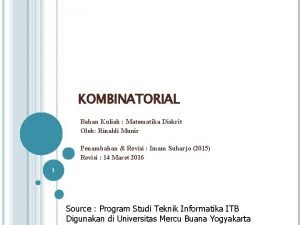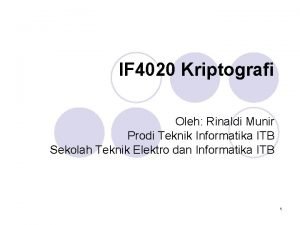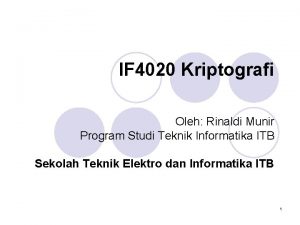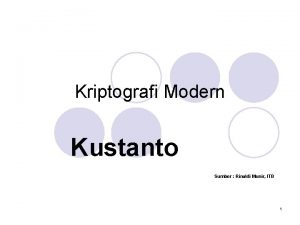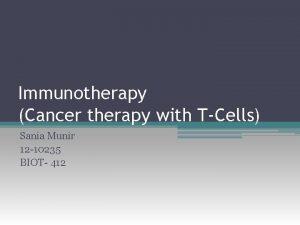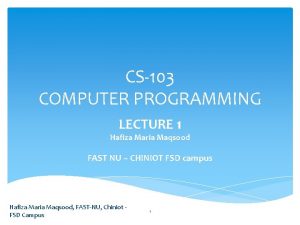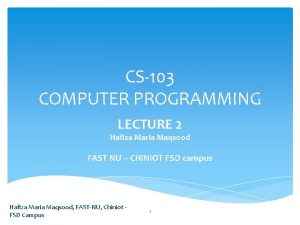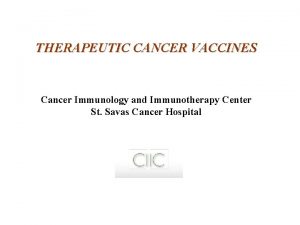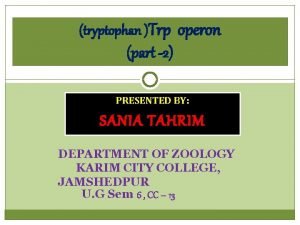Cancer Immunotherapy Presenters Maria Maqsood Sania Munir Cancer
















- Slides: 16

Cancer Immunotherapy Presenters: Maria Maqsood ξ Sania Munir

Cancer immunotherapy • Proffered over surgery, radiation and chemotherapy. • WHY? ?

Cancer Immunotherapy • specificity of immune mechanisms could be harnessed against tumor cells. • This might use: • the patient's own immune system (immunostimulants) • the transfer of – antibodies (i. e. passive immunization) or – T cells from an outside source.

Immunostimulants • T cells are present in cancer patients. • Immune surveillance fails here. • So immunostimulants are being used: – injection of adjuvant like agents – interleukin-2 – alpha-interferon

Cancer Therapy with Monoclonal Antibodies • monoclonal antibodies show promise against cancer, especially cancers of white blood cells (leukemias, lymphomas, and multiple myeloma).

• Rituximab (trade name = Rituxan®): Used to treat B-cell lymphomas. • Herceptin®: Binds HER 2, a growth factor receptor found on some tumor cells (some breast cancers, lymphomas). • Alemtuzumab (Mab. Campath®): Binds to CD 52, a molecule found on white blood cells.

• Lym-1 (Oncolym®): Binds to the HLA-DRencoded histocompatibility antigen that can be expressed at high levels on lymphoma cells • Bevacizumab (Avastin®): Binds to vascular endothelial growth factor (VEGF) thus blocking its action and depriving the tumor of its blood supply.

• Cetuximab (Erbitux®): Used to treat colorectal cancers. • Ipilimumab (Yervoy®): Blocks the immunosuppressive effects of CTLA-4 (thus a double-negative).

Immunotoxins • It should have two parts: – monoclonal antibody specific for the cancer cell attached to – a cytotoxic drug or toxin that kills the cell once it gets inside. • Only one has been approved by FDA yet.

Immunotoxins • Adcetris®: a conjugate of a: – monoclonal antibody that binds CD 30 – vedotin, a drug that blocks mitosis by preventing the polymerization of tubulin (needed to form the mitotic spindle).

Immunotoxins • The vedotin is attached to the monoclonal antibody by a bridge that is cleaved once the conjugate is safely inside the tumor cell releasing the toxin to do its work there. • In one trial, 73% of the patients with Hodgkin's lymphoma went into remission.

Radio immunotherapy • Monoclonal antibodies against tumor antigens can also be coupled to radioactive atoms. • The goal with these agents is to limit the destructive power of radiation to cancerous cells.

Radio immunotherapy • Zevalin®: This is a monoclonal antibody against the CD 20 molecule on B cells (and lymphomas) conjugated to either – the radioactive isotope indium-111 (111 In) – Or – the radioactive isotope yttrium-90 (90 Y).

Radio immunotherapy • Bexxar® (tositumomab). This is a conjugate of a monoclonal antibody against CD 20 and the radioactive isotope iodine-131 (131 I). • On 3 February 2005, the New England Journal of Medicine reported that 59% of patients with a Bcell lymphoma were disease-free 5 years after a single treatment with 131 I-tositumomab (a treatment that was relatively free of the nasty side-effects, e. g. , hair loss, of conventional chemotherapy).

Cancer Vaccines • The purpose of cancer vaccines is to elicit a more powerful active immunity in the patient. • Patient specific cancer vaccines are being made. – Dendritic-Cell Vaccines – Patient-Specific Tumor Antigen Vaccines

Tumor-Antigen-Specific Vaccines • These vaccines are used to immunize the patient with an antigen universally expressed by tumors of that type (but not by normal cells) mixed with some form of adjuvant that will enhance the response. • Example is: – MAGE-A 3 is a protein common on cancer cells. A vaccine using MAGE-A 3 — along with an adjuvant — is in Phase III clinical trials to assess its effectiveness against melanoma and lung cancer.




